Crisis Response Unit
Crisis Response Unit (CRU) is a program that assists in urgent problems. Units can be composed of police officers, behavioral health specialists and physicians, and may also include SWAT teams.
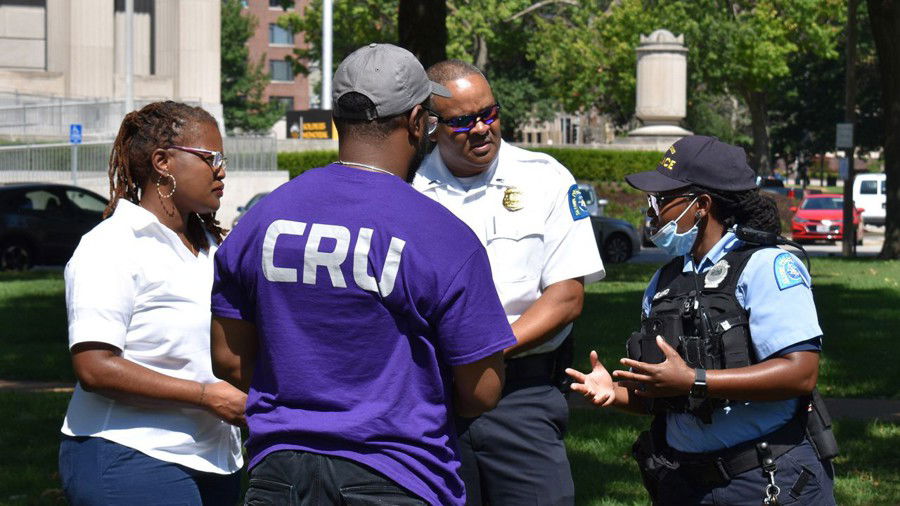
Their goals are:
- answer emergency calls;
- recruit people with necessary resources;
- provide first aid and non-emergency medical care;
- and other necessary roles.
At Pandemic: Rapid Response, we work by connecting people and places to achieve needed resources, which is one of the main goals of a Crisis Response Unit.
Pandemic: Rapid Response - Game Info
Pandemic: Rapid Response is a 2-to-4 players game, age 14+, created by designer Kane Klenko. Art by Jasmine Radue, Atha Kanaani, and Bree Lindsoe.
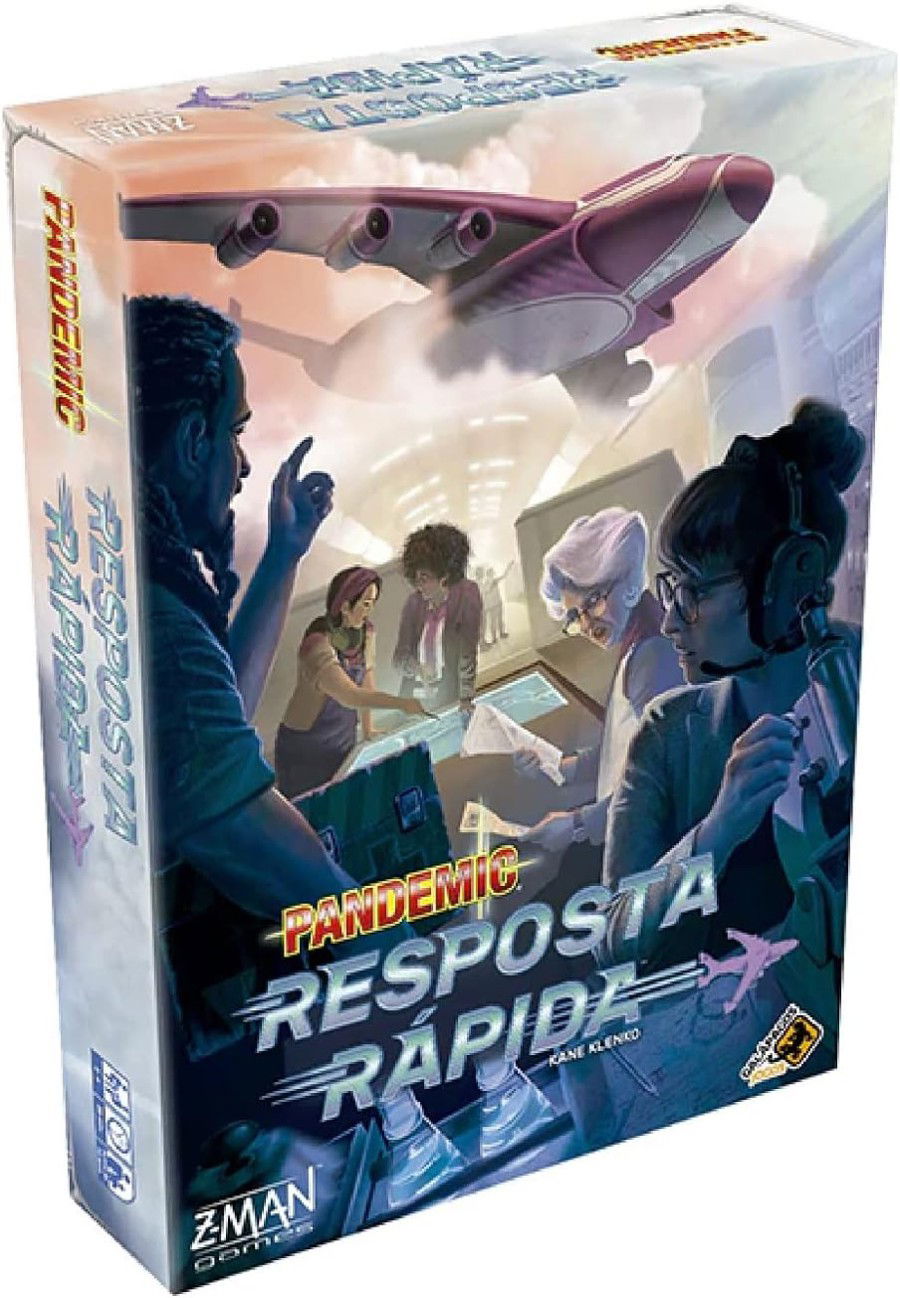
Released in 2019 by Z-Man Games, it was released in Brazil on the same year, by Galápagos. The main mechanics are: gathering sets, cooperation, specialization, hand management, collect and deliver.
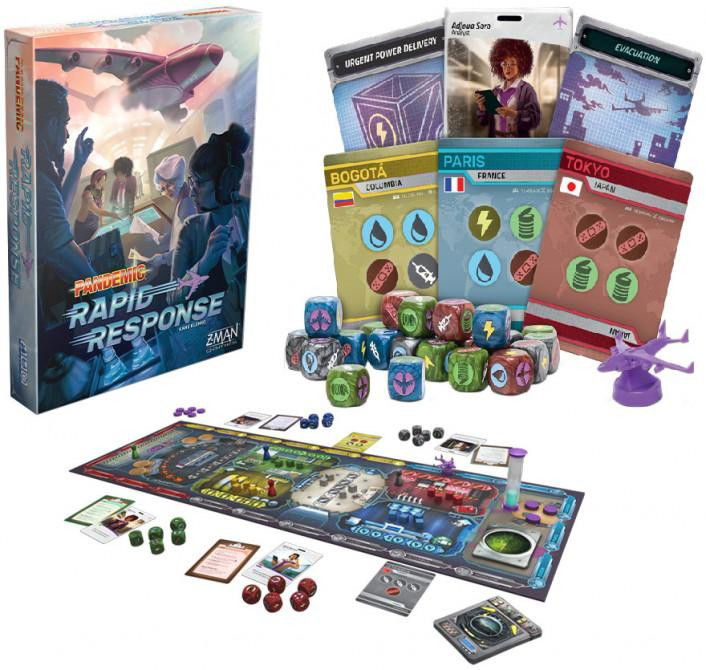
Pandemic: Rapid Response is a spin-off from Pandemic - they share the same theme, but different gameplay.
Let's play!
The Game
We are an elite team from the Crisis Response Unit, abord an airplane specially equipped to prepare essential supplies in-flight, delivering them to cities around the world. It is literally a race against time.
Cities need help and disasters are happening. To make matters worse, the production of supplies inside the plane generates waste, which, if not properly treated and recycled, can contaminate everything and lead to death.
This is the background of Pandemic: Rapid Response!
We are in full flight abord an airplane equipped to produce supplies and deliver them to remote locations around the world. The plane is divided into 4 areas:
- HQ: where we receive information from crisis and weather forecast;
- Supply Rooms: 5 rooms where supplies are made;
- Recycling Center: where the production waste is processed;
- Cargo Bay: where the produced supplies are stored.
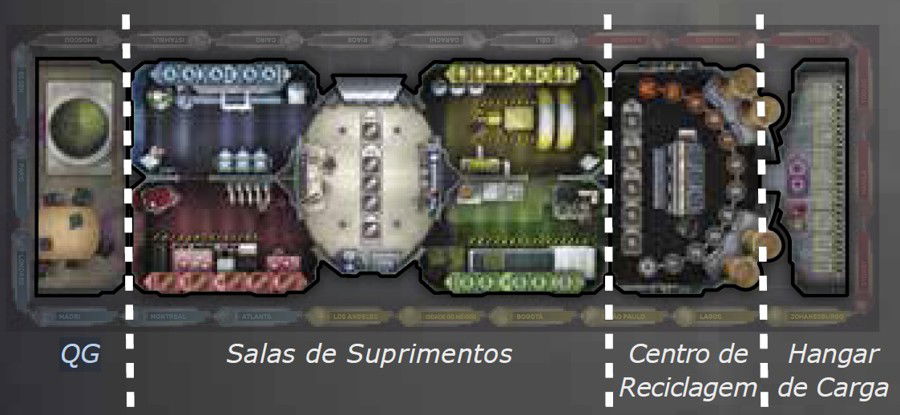
The supplies produced in the 5 rooms are:
- vaccines;
- food;
- power;
- first aid;
- water.

Each player represents a specialist. Each card shows the character's skills and starting point on the plane. The specialists are:
- Analyst: allows you to reroll your dice 2 additional times per turn;
- Director: can place one of your dice in the HQ for other players to use;
- Engineer: when you roll a plane on the dice, it can be changed to any other face;
- Supply Specialist: can place dice to partially fulfill a requirement;
- Flight Planner: when you use dice to move the plane, you move 1 additional city;
- Recycler: rolls one less dice during recycling, that is, you need one less requirement;
- Technician: when you use dice to move between rooms, you can advance 1 additional room.
In the following image, we see the character Raquel Cardoso, Supply Specialist, who starts in the Vaccines Room, along with her data and her role card.
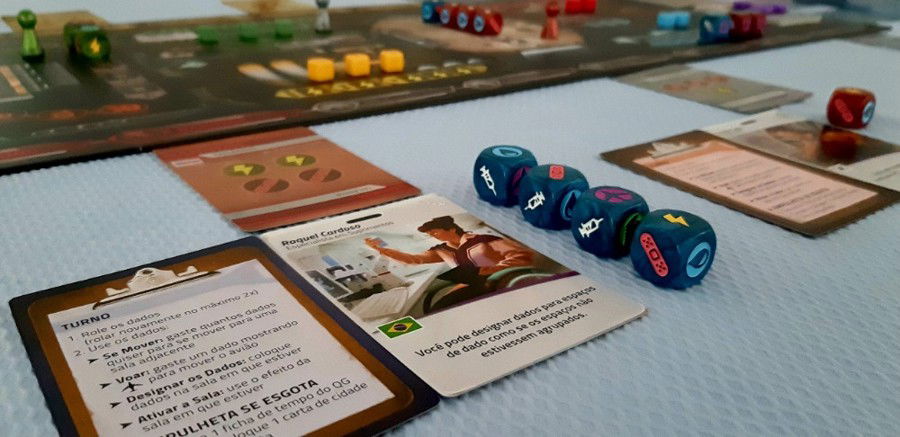
After all players have placed their pawns in their starting rooms, taken their dice and role card, 2 cards of cities in crisis are opened, and 3 remain “closed” in the HQ with 3 time tokens. Another 6 time tokens are placed next to the board. Decide who will be the first player, turn the hourglass and the race against time – that is, the game – begins!
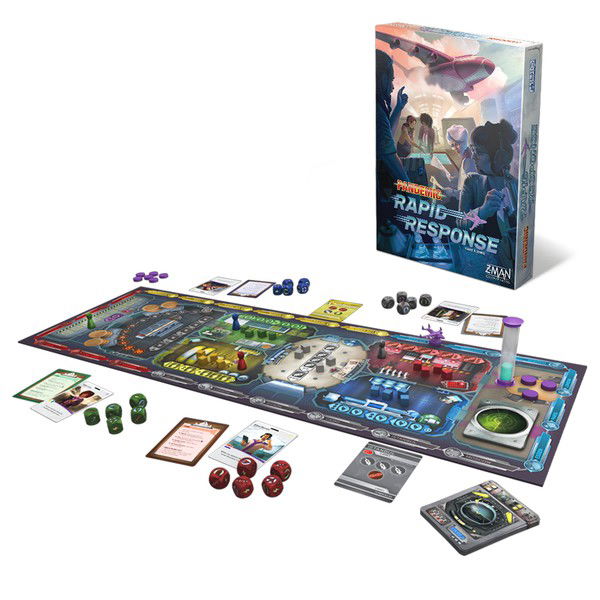
The turn goes like this:
1) Roll the dice: roll all your available dice and, if necessary, reroll up to 2 more times;
2) Use the dice: there are 4 possible uses:
- move: spend 1 die to move to the adjacent room, repeating for each movement;
- fly: spend 1 die with the airplane to move the plane to an adjacent city;
- assign dice: allocate the dice in the room you are in to produce the respective supply AND
- activate the room: use the effect of the room you are in.
At the beginning of the turn, roll all available dice, analyze the result, keep what is necessary and, if desired, reroll up to 2 times the unwanted dice. If you are in the vaccination room, look for results with the vaccine, for example.
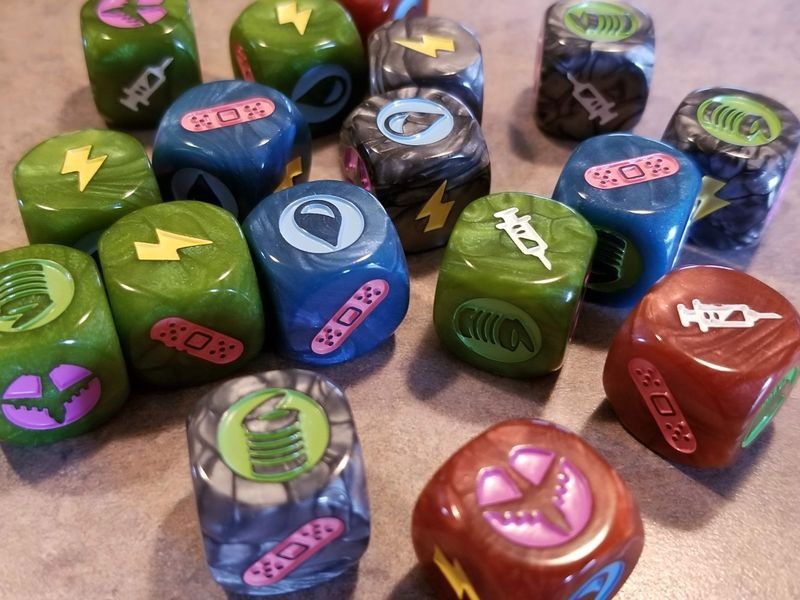
After finishing the roll, it's time to use the dice, and for this we have 4 options:
- by spending any die, regardless of the result, you can move between rooms (1 die per room);
- by using a die with the plane, you can move the plane to an adjacent city (1 die per advance);
- assign the relevant dice in the room where the player is, for example, dice with the vaccine face in the vaccine room;
- produce supplies after allocating the necessary dice, activating them and sending the supplies to the cargo bay.
Note: if you assign dice and do not use them immediately, they remain “stuck” until the required amount of dice is met. In other words, your dice can remain in the room waiting for another player to complete them, or they can only be used on another turn of yours.
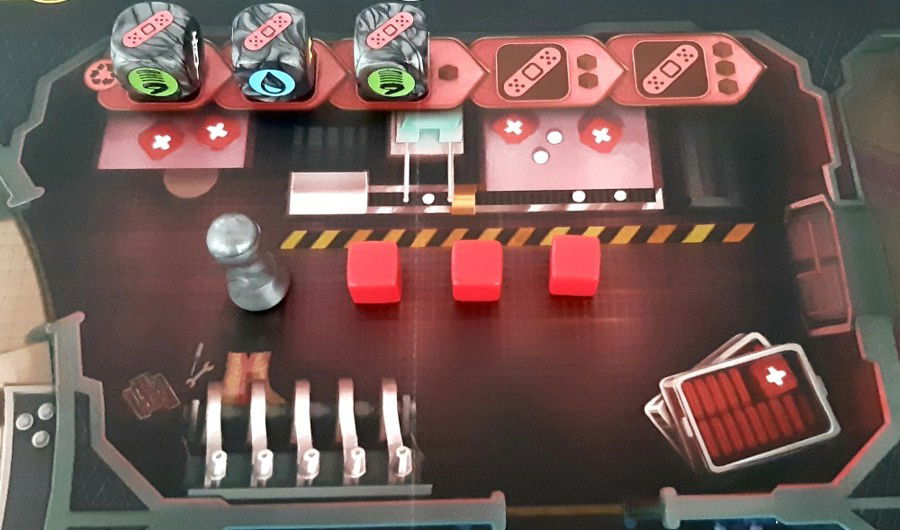
To assign and activate are concepts used extensively throughout the game. For example, to deliver parachuted supplies to a city in crisis, you must fly over the city, place a die with the plane face on it in the hangar, and activate it.
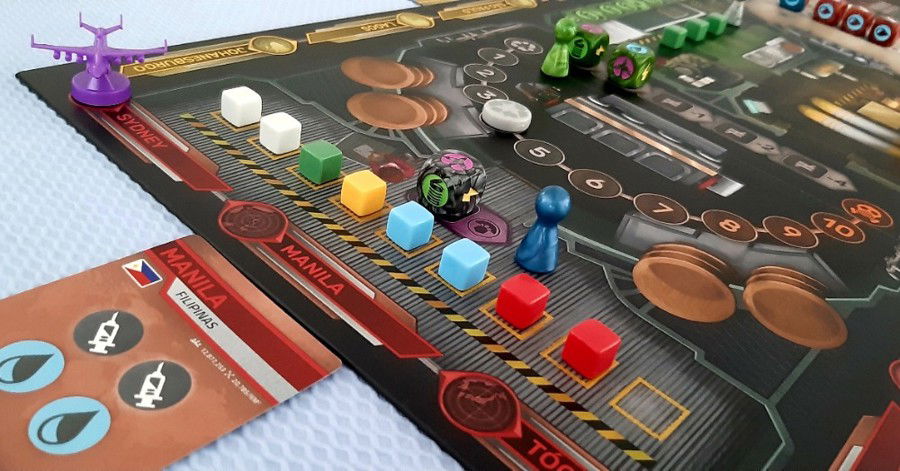
When supplies arrive at a city, the crisis is solved, and you gain 1 time token that will be placed at the HQ.
This is a turn of Pandemic: Rapid Response – but there is still one very important detail. The game is in real time: everyone must keep an eye on the hourglass, and when it runs out, the game stops. So, follow these steps:
- 1) discard 1 time token from the HQ;
- 2) take 1 city in crisis card from the HQ and put it in play;
- 3) flip the hourglass and resume the game.
It would be simple if everyone could talk and strategize at this moment, but then reality comes crashing in the game: time is on the run. More cities have entered into crisis and time is running out. Therefore, no dialogue is allowed: everyone must read the situation and act in the best way possible.
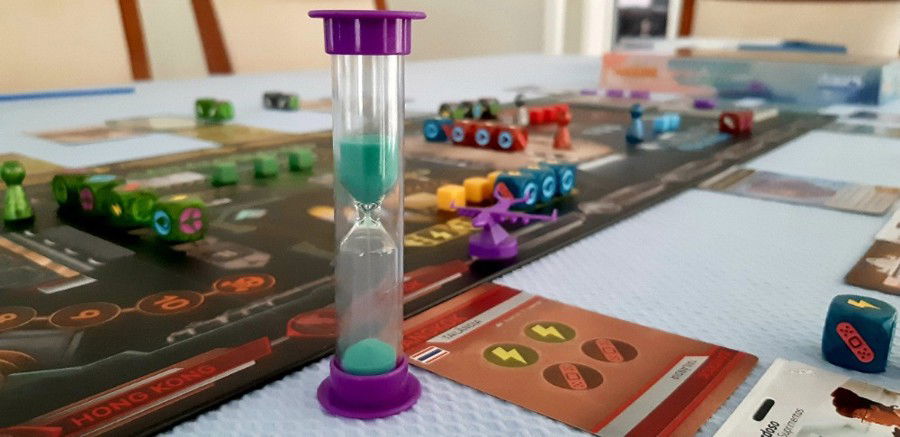
This is how Pandemic: Rapid Response works!
Ending the Game
In Pandemic: Rapid Response, everyone wins or loses together.
To win, you must:
- deliver supplies to all crisis city cards;
- empty the crisis city deck at the HQ.
If one of the following happens, players immediately lose:
- the hourglass runs out and there are no more time tokens at the HQ to discard;
- the waste marker reaches the last space on the waste track, meaning everyone is contaminated.
And that's it!
Strategy Tips
Pandemic: Rapid Response is a fast-paced game, typical of real-time, hourglass, or time trial games — all help is needed. You need to be agile, quick to decide and respond, take advantage of skills, as well as pay attention to the game and read the board well. It really is a team game, and a focused team makes all the difference.
Although it is recommended not to use specialists in the first game, they can be very useful in many situations. The game makes this suggestion because the pace is so fast that many players focus only on the dice and forget about the special skills, which is a fact.
Let's analyze how to use them best:
The Analyst allows two more rerolls, which is essential when you need a specific supply. The Director is very useful, since she can store a specific die in the HQ for any other player to use.
The Engineer converts an airplane die to any other side, which is great. The Supply Specialist allows you to partially fulfill a requirement, something that is very desired in games. To speed up the arrival of the plane in cities, the Flight Planner guarantees an extra movement every time you move the plane, a great advantage against time.
Despite the focus on producing resources, recycling is essential: the Recycler speeds up this process by using one less die, making everything efficient. Finally, the Technician facilitates quick movement between rooms, being able to help wherever needed.
There are 7 specialists for 4 players, reinforcing the spirit of urgency and desperation that the game presents.
The game also includes crisis cards, which add extra difficulty. Three types can appear:
- Immediate: requiring evacuation of the plane, equipment failures, leaks or urgent training;
- Temporary: turbulence, extreme winds and even distraction of specialists;
- Deliveries: urgent and unexpected demands for supplies.
These elements add more flavor to the game, simulating real-life situations, in addition to increasing the difficulty.
Also, it is possible to adjust the level of difficulty in the setup:
- Easy: 2 initial cities in crisis and 3 “closed” at the HQ;
- Normal: 2 initial cities in crisis and 5 “closed” at the HQ;
- Veteran: 3 initial cities in crisis and 7 “closed” in the HQ;
- Heroic: 4 initial cities in crisis and 9 “closed” in the HQ.
For this Review, I used the Easy setup.
Be smart, strategize, manage your resources and win in Pandemic: Rapid Response!
Unboxing, Rules and Gameplay videos
Unboxing:
Rules:
Gameplay:
Pedagogical Tips
If you are looking for a game that draws children's attention, encourage teamwork, speed and decision-making, Pandemic: Rapid Response is the game for you!
The dynamic nature of rolling dice against the hourglass makes children have fun, laugh a lot and create exciting memories.
Allow children to plan their strategy before starting, discussing “who will do what”, as this strengthens team spirit and a sense of belonging.
Take advantage of these moments to share, laugh, learn from mistakes and adapt decisions. Play again and correct your strategies. Defeating the hourglass and solving the crisis will be a source of great joy. What next? Increase the difficulty level, add crisis cards and up the challenge for the group. The game has great replayability, since each run is unique.
From an educational perspective, Pandemic: Rapid Response stimulates management, strategy, decision-making, logical-mathematical reasoning and, above all, it is fun!
I recommend Pandemic: Rapid Response for your collection!!!









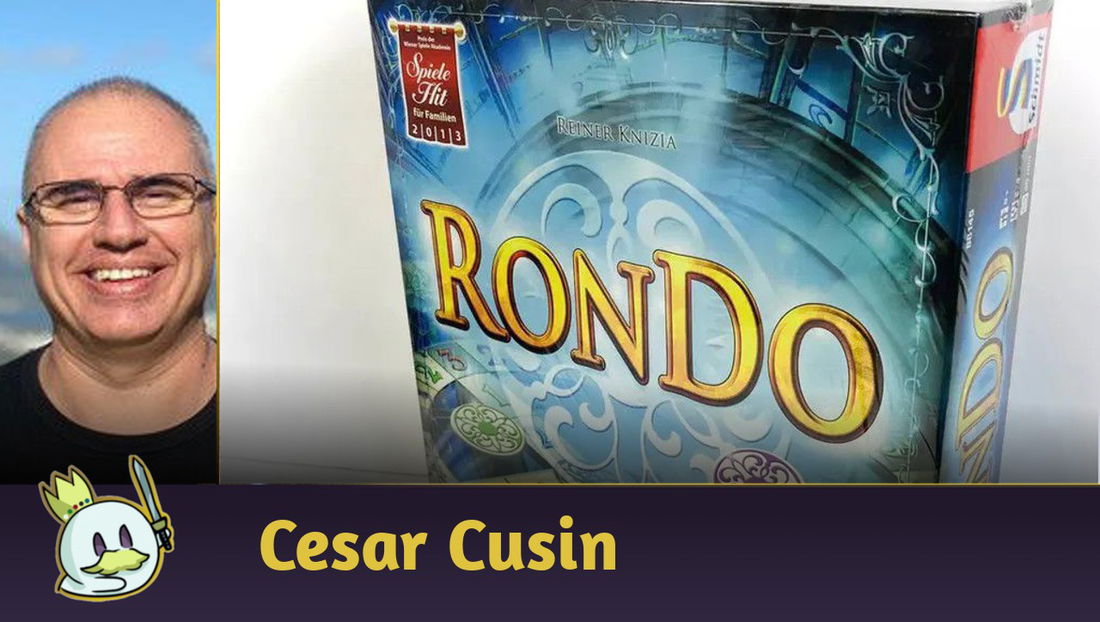



— Comentarios 0
, Reacciones 1
Se el primero en comentar